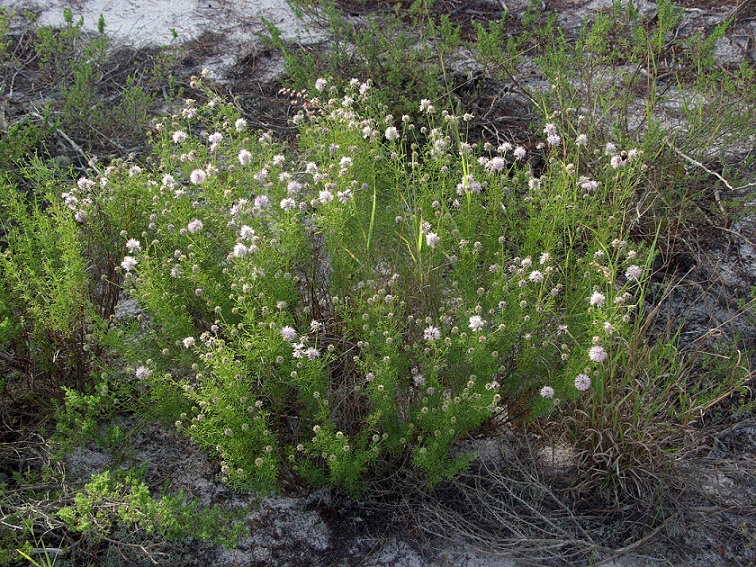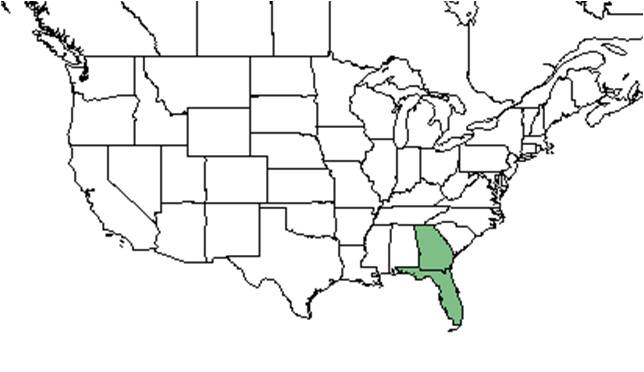Dalea feayi
| Dalea feayi | |
|---|---|

| |
| Photo by Mark A. Garland, hosted by the USDA-NRCS Plants Database | |
| Scientific classification | |
| Kingdom: | Plantae |
| Division: | Magnoliophyta - Flowering plants |
| Class: | Magnoliopsida - Dicotyledons |
| Order: | Fabales |
| Family: | Fabaceae ⁄ Leguminosae |
| Genus: | Dalea |
| Species: | D. feayi |
| Binomial name | |
| Dalea feayi (Chapm.) Barneby | |

| |
| Natural range of Dalea feayi from USDA NRCS Plants Database. | |
Common name: Feay's prairie clover
Contents
Taxonomic notes
Synonym: Petalostemon feayi Chapman.[1]
Varieties: none.[1]
Description
D. feayi is a perennial species and is one of only four prairie clovers native to Florida.[2][3] It is erect and has a rounded growth.[3]
Distribution
Found in the Florida peninsula and some areas in Georgia [3].
Ecology
Habitat
In the Coastal Plain in Florida, D. feayi can be found in pine/oak sandhills; open oak scrubs; thinly wooded longleaf pine/live oak ridges; and Pinus clausa/Ceratolia scrub with Sabal etonia and Bumelia lacuum. [4] It has been found in human impacted areas such as roadsides, recently planted citrus groves, disturbed xerophytic oak-sand pine scrubs, and bulldozed slash pine/oak scrub. It has been found growing in Paola (Spodic Quartzipsamments) soil. [4]
Associated species include Quercus chapmanii, Paronychia erecta, Calamintha coccinea, Liatris provincialis, Dalea feayi, Polygonella robusta, Heterotheca subaxillaris, Pityopsis, Licania michauxii, myrtle oak, and sand pine.
Phenology
D. feayi has been observed to flower between March and September with peak inflorescence July to September and fruits in September. [4][5]
Fire ecology
It is an obligate seeder and ha observed to revitalize following fire. [6]
Pollination and use by animals
Dalea feayi has been observed at the Archbold Biological Station to be visited by bees such as Bombus impatiens (family Apidae), sweat bees from the Halictidae family such as Agapostemon splendens, Augochlorella aurata, Augochloropsis sumptuosa, Halictus poeyi and Lasioglossum nymphalis, leafcutting bees from the Megachilidae family such as Anthidiellum perplexum, Anthidium maculifrons, Megachile brevis pseudobrevis, M. deflexa, M. inimica and M. petulans, thread-waisted wasps from the Sphecidae family such as Bembix sayi, Bicyrtes capnoptera, Cerceris bicornuta, Isodontia exornata, Sphex dorsalis, Tachytes grisselli and T. pepticus, and wasps from the Vespidae family such as Stenodynerus fundatiformis and Zethus spinipes.[7]
Conservation, cultivation, and restoration
Cultural use
Photo Gallery
References and notes
- ↑ 1.0 1.1 Weakley, A.S. 2015. Flora of the southern and mid-atlantic states. Working Draft of 21 May 2015. University of North Carolina at Chapel Hill, Chapel Hill, North Carolina.
- ↑ [USDA Plants]Accessed: December 9, 2015
- ↑ 3.0 3.1 3.2 [Native Florida Wildflowers] Accessed: December 7, 2015
- ↑ 4.0 4.1 4.2 Florida State University Robert K. Godfrey Herbarium database. URL: http://herbarium.bio.fsu.edu. Last accessed: October 2015. Collectors: Loran C. Anderson, Edwin L. Bridges, Jim Buckner, Steven P. Christman, George R. Cooley, R.K. Godfrey, Delzie Demaree, Robin B. Huck, Duane Isley, C. Jackson, Walter S. Judd, R. Kral, O. Lakela, Robert J. Lemaire, Sidney McDaniel, Julie Neel, Steve L. Orzell, James D. Ray Jr., Paul Redfearn, William Reese, Bob Simons, Victoria I. Sullivan, Steve Weaver, Don K. Wemple. States and Counties: Florida: Brevard, Franklin, Hernando, Highlands, Indian River, Marion, Polk, Putnam, St. Lucie, Wakulla. Compiled by Tall Timbers Research Station and Land Conservancy.
- ↑ Nelson, G. PanFlora: Plant data for the eastern United States with emphasis on the Southeastern Coastal Plains, Florida, and the Florida Panhandle. www.gilnelson.com/PanFlora/ Accessed: 8 DEC 2016
- ↑ Abrahamson, Warren G., and Christy R. Abrahamson. “Effects of Fire on Long-unburned Florida Uplands”. Journal of Vegetation Science 7.4 (1996): 565–574.
- ↑ Deyrup, M.A. and N.D. 2015. Database of observations of Hymenoptera visitations to flowers of plants on Archbold Biological Station, Florida, USA.